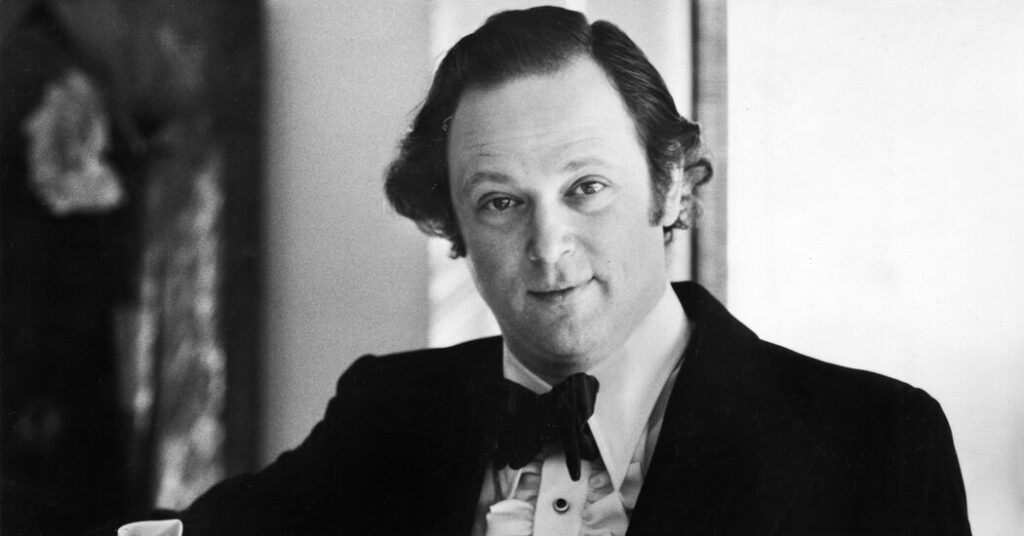Paul Sperry, a tenor who championed little-known American artwork tune and spiky up to date works, and who was praised for his incisive performances of the classics, died on June 13 in Manhattan. He was 90.
His dying, in a hospital, was attributable to coronary heart failure, his son Ethan stated.
In a self-discipline the place his friends tended to stay to tried-and-true German and French classics from the Nineteenth and Twentieth centuries, Mr. Sperry carved out a distinct segment, singing songs by residing composers from his personal nation. However he additionally took on a number of the most tough late-Twentieth-century Europeans, like Karlheinz Stockhausen and Hans Werner Henze, who had been shunned by many singers. That boldness, his son recalled, earned him regular work.
Mr. Sperry, a Harvard Enterprise Faculty graduate who eschewed a profession in actual property and turned to singing, his past love, in his late 20s, was a low-key performer who constantly earned excessive marks from music critics over three many years. They cited his clever strategy to tune, his understanding of texts and his imaginative applications.
“Paul Sperry is a real connoisseur’s singer — he could not have essentially the most glamorous tenor voice possible, however he does some fantastic issues with it, and his programing is at all times attention-grabbing and exploratory,” the critic Peter G. Davis wrote in The New York Instances in 1975 in reviewing a recital of lieder, together with works by little-known 18th century composers who preceded Schubert.
When critics discovered fault together with his voice — Mr. Sperry was most comfy in deeper registers — they nonetheless praised the mind and musicianship behind it.
“Additional up, the voice turns grainy, gritty and constricted. Even then, his interpretative virtues are so pronounced that it hardly a lot issues,” John Rockwell wrote in The Instances in 1977.
“These virtues,” Mr. Rockwell added, “begin with a exact musicality in issues of pitch and rhythm, prolong to a sensitively intuitive present for phrasing and proceed with a strong linguistic command — 11 languages — and a pleasant feeling for dramatic sentiment.”
Mr. Sperry delighted in performing showy, typically Broadwayesque works by little-known composers he was near, reminiscent of Tom Cipullo and Robert Beaser, in addition to the mocking, angular works of American classics just like the songs of Charles Ives. Critics had excessive reward for Mr. Sperry’s consideration to phrases; in Francis Poulenc’s tune “Montparnasse,” based mostly on the poem by Guillaume Apollinaire, his diction was impeccable and he was alive to the nuances of Apollinaire’s wry surrealism.
However he was most drawn to American music. “Whether or not I’m singing Theodore Chanler, or Richard Hundley, or Paul Bowles, or Arthur Farwell, or what have you ever, I’m pounding the drum for American music as a result of I believe it’s fantastic,” Mr. Sperry advised the music critic Bruce Duffie in 1989. “I really feel that I’m doing one thing that I do higher than different folks — not higher than all people, however it’s the place I really feel I’ve one thing actually particular to supply.”
Critics abroad additionally observed. Writing in Gramophone, the British classical music journal, in 1981, Edward Greenfield praised Mr. Sperry’s “wonderful singing” in a recording of his premiere efficiency of Leonard Bernstein’s “Dybbuk” suite. There have been many different premieres all through his profession, a lot of them American works, together with “Canti del Sole” by Bernard Rands, which received the Pulitzer Prize for music in 1984. Mr. Henze, Bruno Maderna and William Bolcom had been among the many main composers who wrote for him.
Mr. Sperry additionally had a full profession as an educator, educating American tune and the Nineteenth- and Twentieth-century tune repertoire on the Juilliard Faculty and the Manhattan Faculty of Music. “Paul was very particular to me,” Daybreak Upshaw, the celebrated American soprano, wrote in a observe to Mr. Sperry’s son after his dying. “A mentor and an inspiration in my early skilled life.”
Mr. Sperry had little persistence for complaints, from both listeners or performers, concerning the difficulties of latest music. “What younger singers are actually saying after they say that’s that they don’t wish to work that arduous!” he advised the music critic Richard Dyer of The Boston Globe in 1992. “It does take effort and time, and generally the music shouldn’t be effectively written — normally I can inform if a chunk isn’t effectively written as a result of I can’t inform if I’m off, and the composer can’t both!”
Paul John Sperry was born on April 14, 1934, in Chicago to Leonard Sperry, a profitable businessman who contributed to the event of the Xerox machine, and Rose (Adler) Sperry. He attended the Putney Faculty in Vermont and graduated from Harvard School in 1956 with a level in psychology and from Harvard Enterprise Faculty in 1959 with an M.B.A.
Mr. Sperry studied French civilization on the Sorbonne and took singing classes with the famend French baritone Pierre Bernac, Francis Poulenc’s associate, in Paris. They remained shut till Mr. Bernac’s dying in 1979. Mr. Sperry made his New York recital debut at Alice Tully Corridor in 1969.
He would go on to sing all around the world; make quite a few recordings, together with of Schubert’s “Winterreise,” which his son stated he thought-about the summit of tune; and compile and edit eight books of American tune.
Along with his son Ethan, Mr. Sperry is survived by two different sons, Raphael and Joshua; a brother, Leonard; a sister, Deborah Goldyne; and 7 grandchildren. His spouse, the sculptor Ann Sperry, died in 2008.
“If my dad had had his means, he would have been the good American lieder singer, however no one wished that,” Ethan Sperry recalled. “He fell into American up to date music, and that was the very best factor that ever occurred to him. He saved on saying, ‘I really like Schubert, however I by no means get to speak to him.’”



